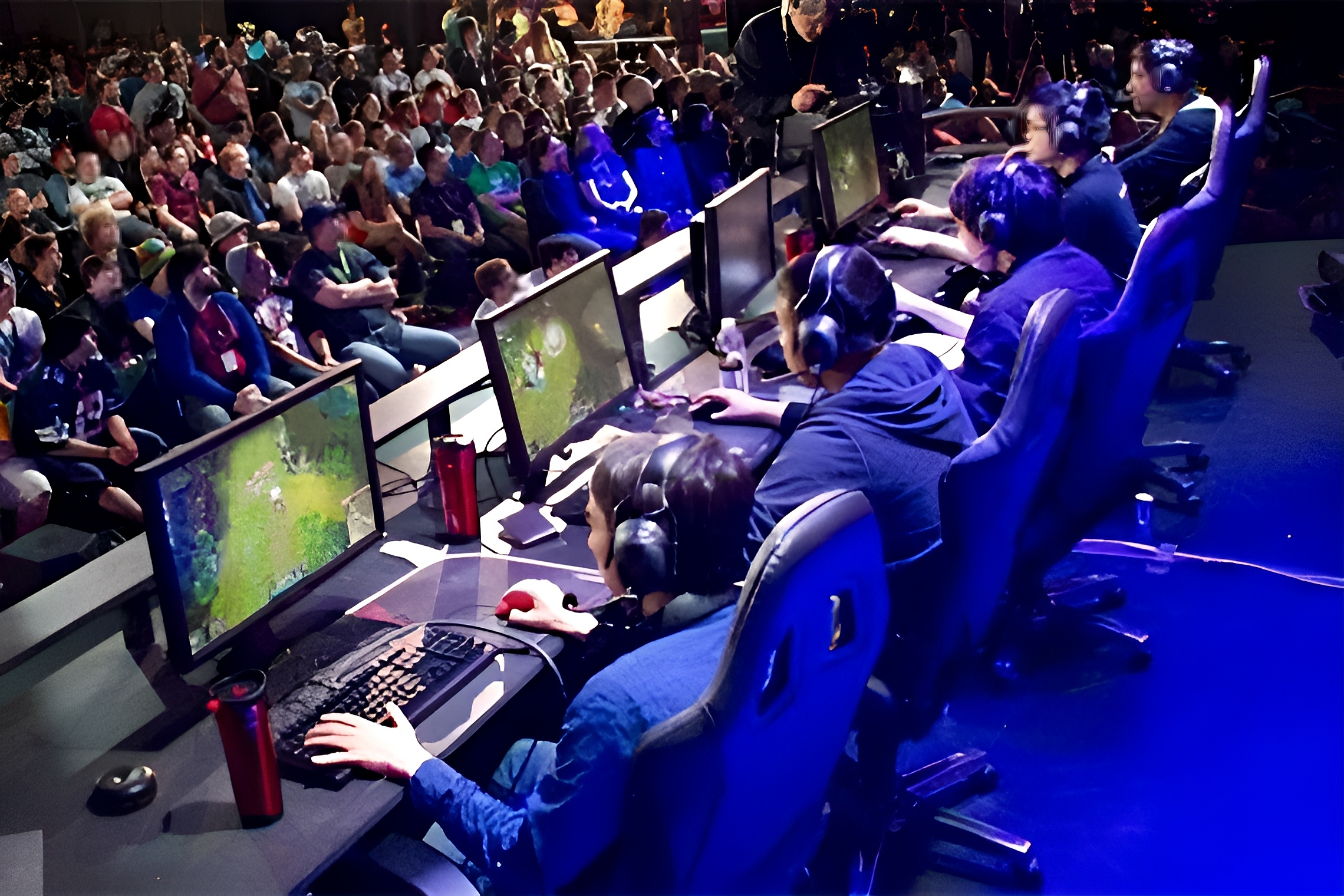In the ever-evolving landscape of competitive games, one of the most intriguing phenomena has been the rise of poker as both a game of skill and a global cultural event. While poker itself is a prominent example of how games can transcend their humble origins, many other games have undergone similar transformations, finding themselves at the intersection of tradition and modernity. This shift has been fueled by technological advancements, the widespread accessibility of online platforms, and a growing global interest in organized competition. In this article, we will explore the dynamics behind the increasing popularity of competitive games, focusing on their role in shaping modern entertainment, the development of digital arenas, and how they influence social interactions across the world.
The Rise of Competitive Gaming
Competitive gaming, also known as esports, has witnessed an explosive growth in recent years. What was once considered a niche interest is now a global industry worth billions of dollars. The rise of esports is fueled by several factors, including the rapid development of internet infrastructure, the increasing power of gaming hardware, and the rise of platforms like Twitch and YouTube that allow players to stream their gameplay to millions of viewers around the world.
One of the key elements contributing to the rise of competitive gaming is the professionalization of the industry. Major game developers now organize official tournaments, offering substantial prize pools and sponsorships from top-tier brands. Games like League of Legends, Dota 2, and Counter-Strike: Global Offensive have developed extensive competitive scenes, with millions of dollars in prize money awarded each year. In many ways, esports has become a legitimate career option for talented gamers, with professional teams, coaching staff, and sponsorships that mirror traditional sports.
The Role of Technology in Shaping the Future of Games
The development of technology has played a crucial role in the expansion of competitive gaming. The power of modern gaming consoles and personal computers, combined with the increasing availability of high-speed internet, has made it possible for players to compete on a global scale. Players from different corners of the world can now participate in the same tournaments, overcoming geographic barriers that previously limited the reach of competitive games.
Another technological advancement that has reshaped the gaming landscape is virtual reality (VR). VR has the potential to revolutionize competitive gaming by providing players with a more immersive and interactive experience. Games like Beat Saber and VR Chat have already started to capture the public’s imagination, offering new ways to experience competitive gaming. As VR technology continues to improve, it is expected that more complex and engaging experiences will be developed, further pushing the boundaries of competitive gaming.
Moreover, the advent of cloud gaming has eliminated the need for high-end gaming hardware, making it easier for individuals to participate in competitive gaming. Services like Google Stadia and Nvidia GeForce Now allow players to stream games directly to their devices, meaning they no longer need to invest in expensive consoles or PCs to access the latest games. This has made gaming more accessible to a wider audience, contributing to the growing popularity of competitive games.
Digital Platforms and Streaming Services: Connecting Gamers Worldwide
Streaming platforms like Twitch, YouTube Gaming, and Facebook Gaming have become central to the esports ecosystem. These platforms allow gamers to stream their gameplay live, interact with viewers in real-time, and build massive online communities. For many, watching others play has become as entertaining as playing the games themselves. Popular streamers have amassed millions of followers, turning gaming into a full-fledged entertainment industry.
Twitch, in particular, has played a pivotal role in the evolution of esports. Initially known for its focus on video game content, Twitch has grown to host a wide range of content, including talk shows, music performances, and creative arts. However, gaming remains at the heart of the platform, and its integration with esports tournaments has made it a go-to destination for fans of competitive gaming. The platform’s interactive features, such as live chat and subscriber-only perks, allow streamers to engage with their audiences in ways that were previously impossible.
Beyond streaming, platforms like YouTube and Facebook have also contributed to the growth of competitive gaming. YouTube hosts countless gaming-related channels, from tutorials to highlight reels, offering viewers a wealth of content beyond live streams. Facebook Gaming has also carved out a niche in the competitive gaming scene, providing gamers with the ability to connect with friends, form teams, and organize events.
The intersection of streaming platforms and competitive gaming has created a new model of fan engagement. Fans no longer just watch esports events; they actively participate in the conversation, support their favorite players, and experience the games in a way that traditional sports fans might engage with their teams.

Global Events and the Commercialization of Competitive Games
One of the most significant aspects of competitive gaming is its commercialization. Esports tournaments, which attract millions of viewers both online and in-person, have become a lucrative business. Major companies and brands are pouring money into esports sponsorships, advertising, and merchandise, recognizing the immense potential of tapping into this growing market.
The rise of esports tournaments has led to the creation of massive global events that rival traditional sports in terms of viewership and prestige. The League of Legends World Championship, for example, attracts over 100 million viewers annually, making it one of the most-watched esports events in the world. Similarly, the International Dota 2 Championship has awarded prize pools exceeding $30 million, further solidifying the notion that competitive gaming is no longer a fringe activity but a mainstream form of entertainment.
These global events have also been instrumental in legitimizing competitive gaming as a viable career path. Players who perform well in these tournaments can secure sponsorship deals, sign contracts with professional teams, and even land endorsement deals with major brands. Esports organizations now employ players, coaches, analysts, and support staff, creating a professional ecosystem that mirrors traditional sports leagues.
Moreover, the rise of betting on esports has introduced a new layer of commercial opportunity. Online sportsbooks and betting platforms now offer odds on major esports events, allowing fans to wager on their favorite teams or players. This has further integrated competitive gaming into the global entertainment and sports markets.
Social Impact and the Cultural Shift
As competitive gaming becomes more mainstream, it is influencing social interactions in profound ways. The rise of online multiplayer games has created virtual spaces where players can form communities, collaborate, and compete with others from around the world. This has led to the creation of a global gaming culture that transcends national borders and language barriers.
One of the most significant ways that competitive gaming is changing social dynamics is by providing opportunities for people to connect with others who share similar interests. In many ways, gaming has become a social activity, with players spending hours in virtual worlds and forming lasting friendships. The rise of team-based games like Overwatch, Fortnite, and Call of Duty has fostered a sense of camaraderie among players, further strengthening the bonds between them.
However, the rise of competitive gaming has also brought attention to issues like toxicity and harassment within online communities. As the competitive gaming scene grows, so too does the need for improved moderation and community management. Many gaming companies and platforms are now implementing measures to combat toxic behavior, such as reporting systems, penalties for abusive conduct, and initiatives to promote positive interactions.
In addition, competitive gaming has played a role in challenging gender norms and promoting inclusivity. While the gaming industry has traditionally been male-dominated, more and more women are participating in competitive gaming, both as players and as viewers. Organizations like the Women in Esports initiative aim to provide support and resources for women in the industry, working towards creating a more diverse and inclusive gaming community.
Looking Ahead: The Future of Competitive Games
As we look ahead to the future of competitive gaming, several trends are likely to shape the next phase of its growth. One of the most exciting developments is the integration of artificial intelligence (AI) into games. AI has the potential to revolutionize both the gameplay experience and the way competitive games are played. AI could be used to create more dynamic and challenging opponents, improving the overall gaming experience. It could also be used to analyze players’ performance, offering insights and recommendations for improvement.
In addition, the continued growth of mobile gaming is likely to play a significant role in the future of competitive gaming. Mobile games like PUBG Mobile and Clash Royale have already captured a large portion of the gaming market, and their competitive scenes are growing rapidly. As mobile technology continues to improve, it is expected that more mobile games will enter the competitive gaming space, offering new opportunities for players and fans alike.
The ongoing evolution of competitive games and esports shows no signs of slowing down. With technological advancements, growing global interest, and a thriving community of players and fans, competitive gaming is poised to become an even more integral part of the entertainment landscape in the years to come. As the industry continues to mature, it will be fascinating to see how it further integrates with traditional sports and entertainment, creating new opportunities for players, fans, and creators alike.







